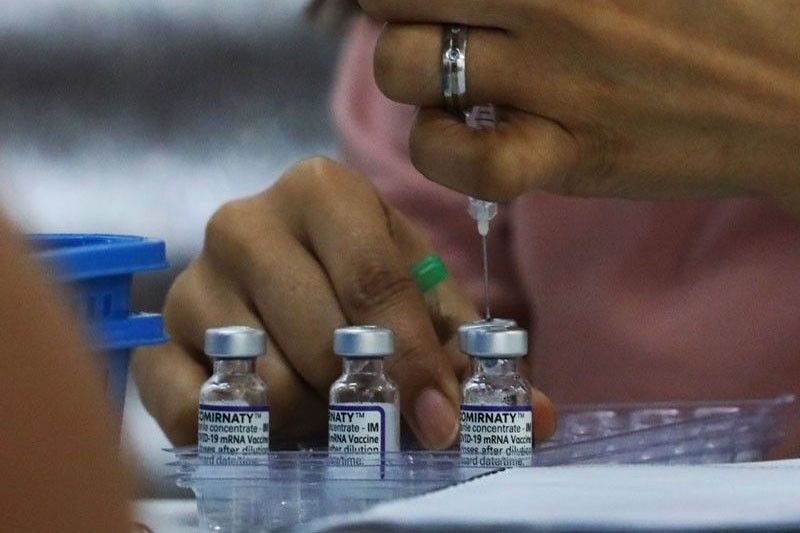Almost 1.4 million donated bivalent jabs to arrive soon

MANILA, Philippines — Almost 1.4 million doses of bivalent COVID-19 vaccines that have been confirmed as donations will arrive in the country soon, the Department of Health (DOH) said yesterday.
“We were able to finalize a commitment from COVAX Facility wherein the latter will donate an initial one million and 2,000 doses of this bivalent vaccine,” DOH officer-in-charge (OIC) Maria Rosario Vergeire said at a press briefing. The donation is expected to arrive before March ends.
“There is also this one country which we cannot name for now because the agreement is still being finalized, but they will donate to us 300,000-plus doses of bivalent vaccines. So right now, we already have a concrete plan for this almost 1.4 million doses of bivalent vaccines,” Vergeire added.
The DOH OIC also said that in addition, negotiations are ongoing with the manufacturers of bivalent jabs Pfizer and Moderna for the procurement of more doses to supplement these donations.
The DOH said health care workers (A1), senior citizens (A2) and people with comorbidities (A3) are the ones to benefit from the first batch of bivalent COVID-19 vaccines. It may be expanded to other priority groups “once additional doses are secured and available.”
“Guidelines will be issued soon so that our local government units can prepare already,” Vergeire said, pointing out that “these bivalent vaccines will be part of the government’s vaccination program for COVID-19, so there will be both monovalent and bivalent vaccines that our government will be providing,”
The health official added that initially, they would only purchase a limited amount to prevent vaccine wastage.
‘Kraken’ subvariant here
The country has recorded its first case of the Omicron subvariant XBB.1.5, or the so-called Kraken subvariant, which earlier reports said is more likely to infect people who have been vaccinated or already had COVID-19.
Out of the 1,078 samples sequenced by the University of the Philippines-Philippine Genome Center and the Research Institute for Tropical Medicine from Jan. 30 to Feb. 3, 196 were found to be XBB that included the XBB.1.5 case tagged as the Kraken and five cases that are still being verified.
They were detected in all regions except Eastern Visayas and the Bangsamoro Autonomous Region in Muslim Mindanao (BARMM).
XBB.1.5 is said to be an offshoot of the XBB subvariant and is classified as a variant of interest, due to its increasing prevalence globally and enhanced immune evading properties.
The Kraken subvariant has been detected in 59 countries across six continents since it was first identified in the United States back in October 2022.
According to the rapid risk assessment done by the World Health Organization, XBB.1.5 has moderate-strength evidence for increased risk of transmission and immune escape.
“However, currently available evidence for XBB.1.5 does not suggest any differences in disease severity and/or clinical manifestations compared to the original Omicron variant,” said the DOH.
The latest genome sequencing results showed that nearly half of the 1,078 samples sequenced belong to the BA.2.3.20 subvariant with 454 cases. They were found in all regions except Eastern Visayas.
As to XBC cases, there were a total of 79 cases detected.
The DOH report also showed 15 cases of the BA.2.75. As to the BA.5, a total of 22 cases were detected under its other sublineages while there were six cases of BQ.1.
For other Omicron subvariants, a total of 160 cases were found in all regions except Bicol Region, Western Visayas, Mimaropa and BARMM with one case still being verified.
Stay vigilant
The DOH has advised the public to stay vigilant even with the decreasing number of COVID-19 cases in the country.
“Not to scare the people, but we are just saying that our reality now is we are not able to capture all cases through our reports,” Vergeire said yesterday. “We know that right now, many of the people do not get themselves tested anymore. Many of our countrymen only use antigen tests.”
Vergeire said one must also be cautious on how they view COVID-19 since there are those who compare COVID-19’s symptoms as similar to the common flu. “People should remain vigilant, cautious and protected,” she said.
The DOH issued the statement after the average COVID-19 cases daily has dropped to 145, as of Feb. 5.
- Latest
- Trending




























